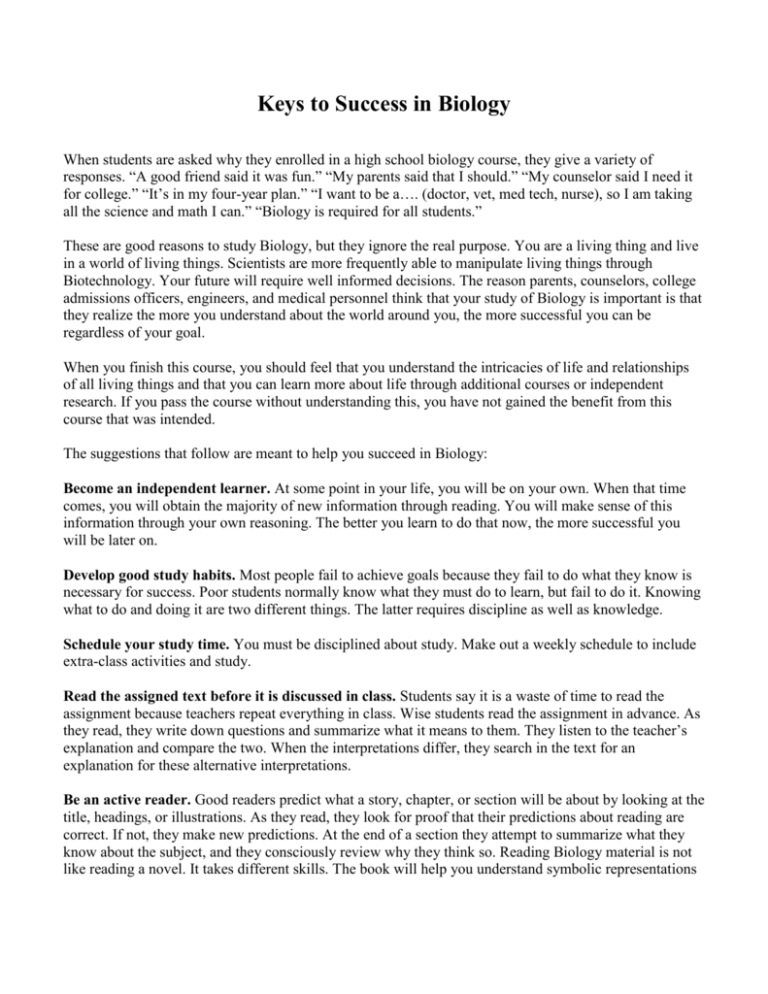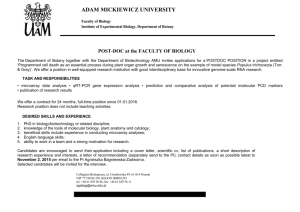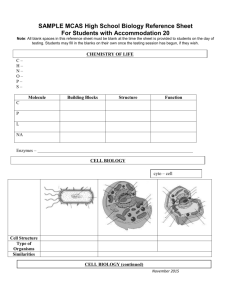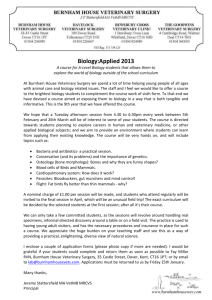Keys to Success in Biology
advertisement

Keys to Success in Biology When students are asked why they enrolled in a high school biology course, they give a variety of responses. “A good friend said it was fun.” “My parents said that I should.” “My counselor said I need it for college.” “It’s in my four-year plan.” “I want to be a…. (doctor, vet, med tech, nurse), so I am taking all the science and math I can.” “Biology is required for all students.” These are good reasons to study Biology, but they ignore the real purpose. You are a living thing and live in a world of living things. Scientists are more frequently able to manipulate living things through Biotechnology. Your future will require well informed decisions. The reason parents, counselors, college admissions officers, engineers, and medical personnel think that your study of Biology is important is that they realize the more you understand about the world around you, the more successful you can be regardless of your goal. When you finish this course, you should feel that you understand the intricacies of life and relationships of all living things and that you can learn more about life through additional courses or independent research. If you pass the course without understanding this, you have not gained the benefit from this course that was intended. The suggestions that follow are meant to help you succeed in Biology: Become an independent learner. At some point in your life, you will be on your own. When that time comes, you will obtain the majority of new information through reading. You will make sense of this information through your own reasoning. The better you learn to do that now, the more successful you will be later on. Develop good study habits. Most people fail to achieve goals because they fail to do what they know is necessary for success. Poor students normally know what they must do to learn, but fail to do it. Knowing what to do and doing it are two different things. The latter requires discipline as well as knowledge. Schedule your study time. You must be disciplined about study. Make out a weekly schedule to include extra-class activities and study. Read the assigned text before it is discussed in class. Students say it is a waste of time to read the assignment because teachers repeat everything in class. Wise students read the assignment in advance. As they read, they write down questions and summarize what it means to them. They listen to the teacher’s explanation and compare the two. When the interpretations differ, they search in the text for an explanation for these alternative interpretations. Be an active reader. Good readers predict what a story, chapter, or section will be about by looking at the title, headings, or illustrations. As they read, they look for proof that their predictions about reading are correct. If not, they make new predictions. At the end of a section they attempt to summarize what they know about the subject, and they consciously review why they think so. Reading Biology material is not like reading a novel. It takes different skills. The book will help you understand symbolic representations like 6CO2+6H2O --C6H12O6+6O2 in addition to pictures, graphs, and tables. These representations are just as important as words. Details and sequences are also important in Biology. Review the ideas covered. If the class dealt with a new process, concept, idea, term, or skill, review this immediately. If you wait a day or two to begin, you will forget the details. Answer the questions at the end of each section of the text that you read. Do this whether assigned or not. These questions reinforce the ideas presented in the reading. If you can answer them without referring to the reading, you probably understand what you read. Do not study a lot of Biology at one sitting. For most students, 30 minutes at a time is enough (though you as an individual may need slightly more or less). A reasonable time spent, five days a week will be much more effective than two or three hours on a weekend. Cram sessions before a major exam are not very effective. You cannot relax before an exam if you know you were not learning the material on a regular basis. On the other hand, if you keep up with your work every day, a short review just before the exam is all you need. Take the night off and relax. You will be alert for the exam, and you will make a higher grade. Over-learn basic skills through practice. Ideas that are used repeatedly must be practiced to the point that you can almost use the ideas in your sleep. When basic ideas or skills are over-learned, all your conscious attention can be given to novel aspects of a problem, and you are more likely to solve it. Be objective. Some students have an unrealistically high opinion of their abilities. When they get poor grades or do not understand what they read, they attribute their lack of success to poorly written test questions or poorly written text. Other students have an unrealistically low opinion of their abilities. When they get a poor grade, they decide they cannot understand Biology. Usually the problem stems from the use of unfamiliar terms and concepts in either the text or the class activities and little effort to clarify terms or concepts. The key to success is having faith in yourself, a positive attitude, organizing your work, and NOT GIVING UP. If you apply these suggestions, you can have fun and understand much more about how the living world operates and make good decisions about yourself, your family, and your society now and in the future.







